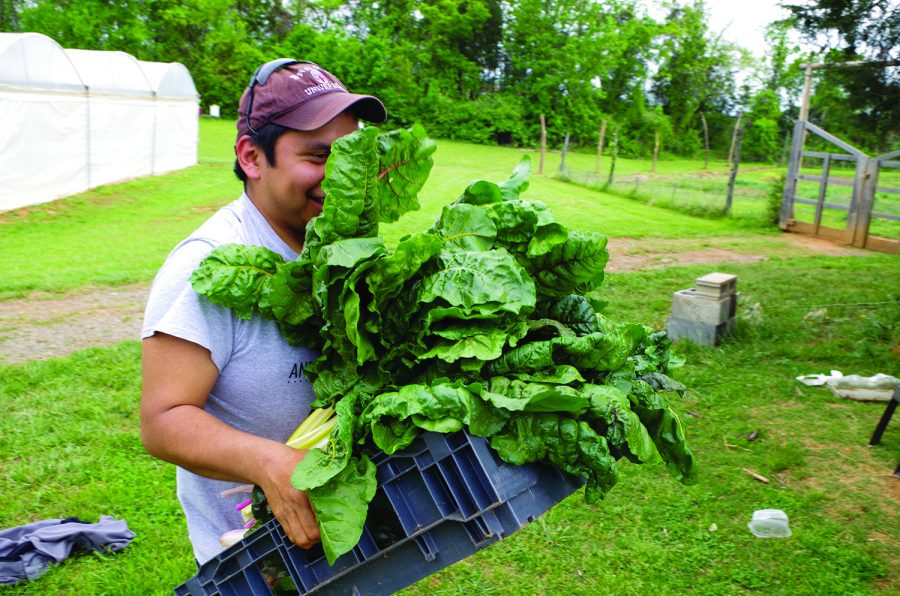Students fight food insecurity in Quaker Cupboard program
Guilford Collge sophomore Elias Smolcic Larson carries chard to the packing shed on the Guilford farm on April 18,2017. Photo By Andrew Walker 2017
In a study done by the National Student Campaign Against Hunger and Homelessness in 2016, 48 percent of college students reported having food insecurity in the past month.
As demonstrated in this study, many students are victims of food insecurity across the United States, and Guilford College students are no exception.
However, Guilford has developed a program to combat this issue. In 2014, the Quaker Cupboard was founded to provide nonperishable food items, toiletries and personal hygiene products to students in need.
“Last semester, we distributed almost 4,800 pounds of food out of here,” said Regina Gardner, the student coordinator for the Quaker Cupboard. “We distributed almost 1,700 pounds of prepared food that we reclaimed from the cafeteria (and took) them to a Bonner site that houses homeless and disabled veterans.”
The Quaker Cupboard often works in conjunction with Guilford’s Bonner Scholars, led by Director of the Bonner Center James Shields. He too hopes to address the level of food insecurity that Guilford students face with his work at the Quaker Cupboard.
“I think the fact that the Quaker Cupboard is (at Guilford is helping),” said Shields. “Especially with some of the adult students that we work with, their situations are a bit more dire than (those of) the traditional students.
“That being said, if you have students here, whether they are off or on campus, and they feel the need to come here for food. It says a lot.”
According to Shields, the current high resources and budget of the Quaker Cupboard allow the organization to place few restrictions on which students can take food and other supplies.
“Guilford students can just come in, grab food and we won’t ask any questions,” said Gardner. “The only thing we ask is if you are on a meal plan, because we are interested in knowing why students on our campus are going hungry.”
Despite its current large resources, the cupboard was not always as well-stocked as it is now.
According to Gardner, when the cupboard was first founded, it was merely a small closet with a few cans. However, this changed two semesters ago when Gardner and her colleague, Anna DeLeon, were hired to work at the Quaker Cupboard as work-study students and helped to revitalize the program.
“We started doing all this research and learned that Greensboro ranked the highest for food insecurity in comparison to other large metropolitan cities,” said Gardner. “Though we’ve since moved down to … (number) nine, the ranking is still significantly high.”
According to the Food Research and Action Center’s Local Index of Food Hardship, the decrease in ranking happened between 2014 and 2015. The Greensboro area is witnessing a slow decrease in food insecurity through the help of programs like the Greensboro Urban Ministry and the Quaker Cupboard.
Through the expansion of its programs, the Quaker Cupboard has been able to contribute to this cause.
“(We have) the crop caravan, which is visiting two different apartment complexes that have large populations of immigrants and refugees to give them fresh produce like beans and different dried goods,” said Guilford Food Access Outreach Coordinator Audrey Waggoner.
Despite the expansion of the Quaker Cupboard program, Shields believes that more work needs to be done to address the issue of food insecurity.
“Why do we have the Quaker Cupboard? Why do we need the Quaker Cupboard?” said Shields. “No one on this campus who pays for tuition should be walking around here hungry.”









